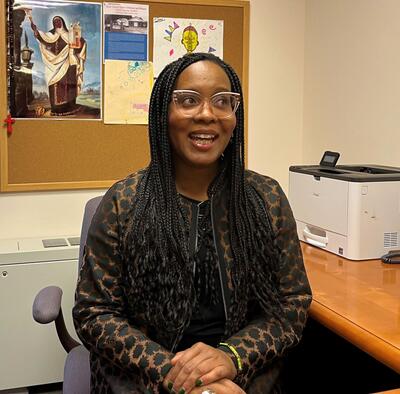By Kim Lawton
 Professor Todne Thomas specializes in what she calls the “slow pressure-cooker research method.” An anthropologist, Thomas believes one of the most effective ways to learn about people and communities is through long-term, intensive, in-person research–ethnography. She stays in the communities she is studying for extended periods of time and talks at length with community members, while observing their activities and participating in their lives.
Professor Todne Thomas specializes in what she calls the “slow pressure-cooker research method.” An anthropologist, Thomas believes one of the most effective ways to learn about people and communities is through long-term, intensive, in-person research–ethnography. She stays in the communities she is studying for extended periods of time and talks at length with community members, while observing their activities and participating in their lives.
Thomas employed this method while researching her first book, Kincraft: The Making of Black Evangelical Sociality, which explored relationships and complexities among Afro-Caribbean and African American evangelicals. Her current research focuses on the unsolved 2015 burning of a predominantly African American church in her hometown of Knoxville, Tenn. It’s a project her mother first suggested.
Thomas is Associate Professor of Divinity and Religious Studies at Yale Divinity School and a leader in the movement to apply ethnography to the study of contemporary Christianity. We caught up with her for the latest edition of Office Hours, a Q&A series that introduces Yale newcomers to the broader university community.
|
TITLE |
Associate Professor of Divinity and Religious Studies |
|
RESEARCH INTEREST |
Anthropology, Ethnography, Race and Religion |
|
PRIOR INSTITUTION |
Harvard Divinity School |
|
STARTED AT YALE |
July 2023 |
Why is ethnography an important method of research for you?
Todne Thomas: Ethnography is deeply meaningful for me as a person and as a citizen. There’s so much that we need to learn from each other. It also means that my scholarship, my classroom, my conversations are never going to be contained within the ivory tower. And I think that that’s so wonderful and balanced and necessary. I have to say that the world often disappoints me, but the kinds of conversations I’m able to have with people rarely do.
How is ethnography particularly effective in helping to understand religion?
Thomas: It moves us away from more top-down approaches to the study of religion. I don’t presume that the most important words or perspectives come from the pulpit. Ethnography is a tool that’s really designed to hear the experiences of people, looking at religious practices, what people do, and not just religion as a belief. It allows us to question and challenge some of our inherited views as scholars about what religion looks like. We might have a dominant picture or a dominant view, but there are other religious worldviews and movements and formations that exist out there.
In your forthcoming book, you examine several theories about this unsolved 2015 Black church arson in Knoxville. What did you learn?
Thomas: I got to ask people, “Who do you think is responsible?” There are definitely some surprises. Some people believe the police themselves could have done it. I also talk about how people say that a gentrifier could have done it. So, there are a number of theories and explanations that the book actually catalogs. The argument of the book is that Black church arson is an interpretive event, and that religious studies, because it’s very sensitive to interpretation, has a real contribution to make.
If we were to do ethnographic research on you, what surprising things might we learn?
Thomas: You would learn that I make a pretty mean pound cake, and I like experimenting with different kinds. Right now, I have two favorites: sour cream pound cake and a lemon lavender pound cake. You might also learn that I have a new puppy, and I’m in over my head. Her name is Hazel, and she’s giving me a run for my money.